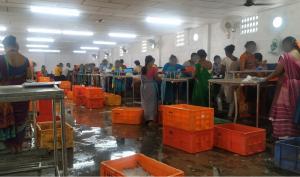Exploitative labor practices, widespread use of banned antibiotics, and environmentally damaging practices found at BAP-certified shrimp facilities in India.
Rather than improving conditions, the BAP certification often masks exploitative practices, misleading U.S. consumers into believing they’re purchasing ethical and sustainable products.”
CHICAGO, IL, UNITED STATES, November 1, 2024 /EINPresswire.com/ -- Today, Corporate Accountability Lab and the Southern Shrimp Alliance co-filed a formal complaint with the Federal Trade Commission (FTC), requesting action against false or deceptive advertising- or marketing-related activities by the Best Aquaculture Practices (BAP) certification scheme, operated by the Global Seafood Alliance (GSA), as well as the many brands and retailers that use and rely on the BAP seal to sell their farmed shrimp products. The petition demonstrates that BAP certification represents Indian shrimp products as safe, responsible, and ethically farmed seafood despite CAL’s findings on the use of exploitative labor practices–including forced labor–as well as the widespread presence of banned antibiotics and environmentally damaging practices. — John Williams, executive director of the Southern Shrimp Alliance
Shrimp is America’s favorite seafood, and India supplies around 40% of all shrimp consumed in the United States. Many shrimp products on U.S. grocery store shelves display the popular BAP certification label, implying compliance with BAP’s human rights and environmental standards.
“GSA, BAP, and retailers promote BAP certification as a tool consumers can use to ensure the seafood meets strict environmental and labor standards,” explained Charity Ryerson, Executive Director of Corporate Accountability Lab. “In practice, BAP certification is little more than a marketing tool. It misleads consumers into thinking all is well, while workers at BAP-certified facilities report severe exploitation and dangerous working conditions, and communities suffer from pollution that has destroyed fisheries and contaminated drinking water.”
During Corporate Accountability Lab’s three-year study of India’s shrimp industry, researchers found that BAP-certified facilities often exhibited working and environmental conditions that were indistinguishable from those at uncertified facilities. Numerous BAP-certified facilities violate Indian laws and international human rights norms in addition to BAP standards. Conditions found at these facilities include forced labor, abusive and unsanitary living conditions, restriction of movement, wage underpayment, and harmful groundwater contamination damaging nearby villages—starkly contradicting BAP’s advertised claims of ethical and responsible practices on its websites, social media, and certification seal.
Certification emphasizing social responsibility and sustainability drives significant change in consumer interest and sales growth. A recent study by NielsenIQ indicated that products branded with Environmental, Social, and Governance claims averaged 8% higher cumulative growth over a five-year period than similar products not making such claims. Another 2024 survey found consumers would be willing to pay nearly 10% more for products that were sustainably produced or sourced goods. Over the years, the FTC has made clear that certifiers are held to the same standards as marketers, warning certifiers to consider consumer perception of their certification system.
The Southern Shrimp Alliance analyzed shrimp entry lines refused by the FDA in 2024. It found that 87% of the shrimp entry lines rejected for antibiotic contamination originated from BAP-certified facilities. Despite testing only 0.1% of imports for banned antibiotics, the FDA refused 71 entry lines of adulterated shrimp between January and September 2024, of which 62 were attributed to BAP-certified shippers.
“BAP’s industry-led certification scheme has clearly failed to fix the many safety, ethical and environmental problems plaguing the Indian shrimp sector,” said John Williams, Executive Director of the Southern Shrimp Alliance. “Rather than improving conditions, the certification often masks exploitative practices, misleading U.S. consumers into believing they’re purchasing ethical and sustainable products. We urge the Commission to address as soon as possible this marketing-related practice that hides egregious human rights violations.”
About
Corporate Accountability Lab is a non-profit human rights organization focused on ending labor and environmental abuses in global supply chains. CAL’s mission is to unleash the creative potential of the law to protect people and the planet from corporate abuse. CAL deploys innovative legal strategies to combat a wide range of egregious abuses – including forced labor and trafficking – by companies operating in the United States and abroad.
The Southern Shrimp Alliance is an organization of shrimp fishermen, shrimp processors, and other members of the domestic industry in the eight warmwater shrimp-producing states of Alabama, Florida, Georgia, Louisiana, Mississippi, North Carolina, South Carolina, and Texas.
Deborah R Long
Cohesive Communications
+1 804-360-0074
email us here
Visit us on social media:
Facebook
X
LinkedIn
Legal Disclaimer:
EIN Presswire provides this news content "as is" without warranty of any kind. We do not accept any responsibility or liability for the accuracy, content, images, videos, licenses, completeness, legality, or reliability of the information contained in this article. If you have any complaints or copyright issues related to this article, kindly contact the author above.



